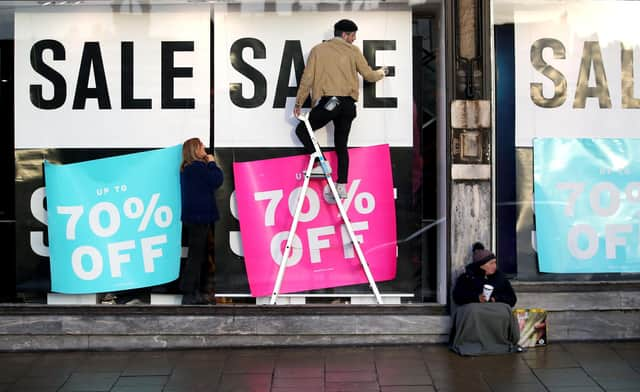The best way to end homelessness is to prevent it - Jon Sparkes


The danger was obvious, the risk was urgent, and the response, from local and national governments, as well as homelessness agencies, was immediate.
The decision to move people from the streets and give them a roof over their heads undoubtedly saved lives. Initially, it protected them from Covid-19. Then, as winter arrived, it protected them from the cold, as temperatures in Scotland fell to some of the lowest in years.
Advertisement
Hide AdAdvertisement
Hide AdIt’s hard to understate the scale of that achievement. Organisations such as Simon Community Scotland and Streetwork utilised decades of their own expertise to reduce numbers of rough sleepers, and then keep them low, as the pandemic continued. Whereas data on rough sleeping figures before March 2020 suggests that over 1,500 people were sleeping out the night before they accessed help, since the pandemic we heard that in many areas the numbers fell to extremely low levels.


It was a decision which fundamentally changed the nature of homelessness in Scotland. Something previously considered impossible – essentially ending the injustice of rough sleeping – was achieved in a matter of days. It saved lives, but it also showed us what we can do when we work together, with expert advice backed by strong political will.
But the response had consequences. People experiencing homelessness were given the support they desperately required, but the result was a record number of people trapped in temporary accommodation.
Already a long standing problem in Scotland even before the pandemic, the last year saw the number of households living in temporary accommodation reach over 14,000.
These are people. Families. Children. Stuck in limbo, provided with a bed and a roof but left unable to move on with their lives, in some cases for long periods of time. In some cases without access to proper cooking or laundry facilities.
Official statistics, released earlier this year, show the average time spent in temporary accommodation also increased, rising from an average of 187 last year up to 199 days in 2020-21.
Meanwhile, as The Scotsman reported last month, 900 families have been waiting for at least two years for a permanent home.
While the number of people rough sleeping may be down, poverty, inadequate welfare support, a lack of joined-up services and a shortage of affordable housing means the number of people currently homeless and trapped in temporary accommodation remains far too high.
Advertisement
Hide AdAdvertisement
Hide AdThat, in essence, is the problem. Scotland has some of the best protections in the world for people who lose their home, but with 8% of Scots having experienced homelessness, it is clear far too many people are being forced through the system in the first place.
So how can Scotland fix this?
The answer lies in the solutions to homelessness identified by the Homelessness and Rough Sleeping Action Group, later adopted by the Scottish Government’s Ending Homelessness Together Plan. While affordable housing supply is crucial and the Scottish Government has an ambitious plan for the supply of social rented housing, ultimately, we can only end homelessness by preventing it. That means providing people with support earlier to stop them from losing their home, instead of making last minute interventions after they have been pushed to a point of emergency. Doing that would benefit us all – stopping more people from experiencing the trauma and indignity of homelessness, while saving money and reducing pressure on stretched local authorities.
This is the logic behind plans, announced by First Minister Nicola Sturgeon in the Programme for Government, to bring forward changes to the law to prevent homelessness in Scotland.
As well as proposals to strengthen existing homelessness prevention legislation, the statement also included a £50 million investment in a new Ending Homelessness Together Fund over the course of the parliament, with £12 million in 2021-22, alongside plans to consult on new homelessness prevention duties.
The announcement, which follows publication of the Crisis-convened Scotland Prevention Review Group report earlier this year, could prove a huge milestone in Scotland’s journey towards ending homelessness.
Set up to examine how to stop people losing their homes in the first place, the group’s report emphasized the need to get people help earlier, starting up to six months before someone faces losing their home. The recommendations would also mean that public agencies, such as health services, should ask about people’s housing situation to identify any issues at an early stage and then act to resolve housing problems.
The proposals would ensure that no one leaves an institution, such as prison or hospital, without somewhere to sleep that night. If implemented, they hold the potential to make Scotland a world-leader in ending homelessness.
And the measures are desperately needed. The threat of Covid still looms over all of us, and Crisis remains deeply concerned that as the economic impact of the pandemic takes effect, more and more people who are currently struggling could be pushed into homelessness.
Advertisement
Hide AdAdvertisement
Hide AdBut while the virus has fundamentally changed our lives, causing loss and suffering across the whole of our society, it has also shown us what we can do with the right political will. The response to the pandemic proved as much.
The Scottish Government is already considering how we can steer out of the pandemic, while helping to build a fairer, greener Scotland, with work from the Social Renewal Advisory Board offering a blueprint for how it could be achieved.
But we can’t stop now. It’s vital that we build on the work of the last 18 months or so, maintaining momentum on the response to rough sleeping and working together to introduce new measures to prevent homelessness. Do that, and together we can build a better and fairer Scotland.
Jon Sparkes is chief executive of Crisis, the UK national charity for people experiencing homelessness
Comments
Want to join the conversation? Please or to comment on this article.